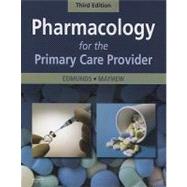
| Essential Concepts for the Prescription of Medications | |
| Foundations of Prescriptive Practice | |
| Prescriptive Authority and Role Implementation: Tradition vs. Change | |
| Historical Review of Prescriptive Authority: The Role of Nurses (NPs, CNMs, CRNAs, and CNSs) and Physician Assistants | |
| Pharmacokinetics and Pharmacodynamics | |
| General Pharmacokinetic and Pharmacodynamic Principles | |
| Special Populations: Geriatrics | |
| Special Populations: Pediatrics | |
| Special Populations: Pregnant and Nursing Women | |
| The Art and Science of Pharmacotherapeutics | |
| Establishing the Therapeutic Relationship | |
| Practical Tips on Writing Prescriptions | |
| Treatment Guidelines and Evidence-Based Decision Making | |
| Design and Implementation of Patient Education | |
| Drug Monographs | |
| Topical Agents | |
| Dermatologic Agents | |
| Eye, Ear, Throat, and Mouth Agents | |
| Respiratory Agents | |
| Upper Respiratory Agents | |
| Asthma and COPD Medications | |
| Cardiovascular Agents | |
| Hypertension and Miscellaneous Antihypertensive Medications | |
| Coronary Artery Disease and Antianginal Medications | |
| Chronic Heart Failure and Digoxin | |
| a-Blockers | |
| Calcium Channel Blockers | |
| ACE Inhibitors and Angiotensin Receptor Blockers | |
| Antiarrhythmic Agents | |
| Antihyperlipidemic Agents | |
| Agents that Act on Blood | |
| Gastrointestinal Agents | |
| Antacids and the Management of GERD | |
| Histamine-2 Blockers and Proton Pump Inhibitors | |
| Laxatives | |
| Antidiarrheals | |
| Antiemetics | |
| Medications for Irritable Bowel Syndrome and Other Gastrointestinal Problems | |
| Renal/Genitourinary Agents | |
| Diuretics | |
| Male Genitourinary Agents | |
| Agents for Urinary Incontinence and Urinary Analgesia | |
| Musculoskeletal Agents | |
| Acetaminophen | |
| Aspirin and Nonsteroidal Antiinflammatory Medications | |
| Disease-Modifying Antirheumatic Medications and Immune Modulators | |
| Gout Medications | |
| Osteoporosis Treatment | |
| Muscle Relaxants | |
| Central Nervous System Agents | |
| Overview of the Nervous System | |
| Medications for Attention-Deficit/Hyperactivity Disorder | |
| Medications for Dementia | |
| Analgesia and Pain Management | |
| Migraine Medications | |
| Anticonvulsants | |
| Antiparkinson Agents | |
| Psychotropic Agents | |
| Antidepressants | |
| Antianxiety and Insomnia Agents | |
| Antipsychotics | |
| Substance Abuse | |
| Endocrine Agents | |
| Glucocorticoids | |
| Thyroid Medications | |
| Diabetes Mellitus Agents | |
| Female Reproductive System Medications | |
| Contraceptives | |
| Menopause Hormone Therapy | |
| Agents Used in Treating Breast Cancer | |
| Antiinfectives | |
| Principles for Prescribing Antiinfectives | |
| Treatment of Specific Infections and Miscellaneous Antibiotics | |
| Penicillins | |
| Cephalosporins | |
| Tetracyclines | |
| Macrolides | |
| Fluoroquinolones | |
| Aminoglycosides | |
| Sulfonamides | |
| Antitubercular Agents | |
| Antifungals | |
| The Immune System and Antiretroviral Medications | |
| Antiviral and Antiprotozoal Agents | |
| Health Promotion | |
| Immunizations and Biologicals | |
| Weight Management | |
| Smoking Cessation | |
| Vitamins and Minerals | |
| Over-the-Counter Medications | |
| Comple | |
| Table of Contents provided by Publisher. All Rights Reserved. |
The New copy of this book will include any supplemental materials advertised. Please check the title of the book to determine if it should include any access cards, study guides, lab manuals, CDs, etc.
The Used, Rental and eBook copies of this book are not guaranteed to include any supplemental materials. Typically, only the book itself is included. This is true even if the title states it includes any access cards, study guides, lab manuals, CDs, etc.